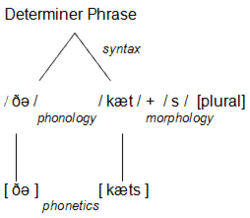Syntax (linguistics): Difference between revisions
Jump to navigation
Jump to search


imported>Chris Day No edit summary |
imported>Caesar Schinas m (Remove Template:Linguistics) |
||
| Line 2: | Line 2: | ||
[[Image:Linguistics-illustration-determinerphrase.gif|right|250px|thumb|{{#ifexist:Template:Linguistics-illustration-determinerphrase.gif/credit|{{Linguistics-illustration-determinerphrase.gif/credit}}<br/>|}}Levels of linguistic knowledge involved in producing 'the cats': these two [[word]]s form a single unit, a ''determiner phrase''.]] | [[Image:Linguistics-illustration-determinerphrase.gif|right|250px|thumb|{{#ifexist:Template:Linguistics-illustration-determinerphrase.gif/credit|{{Linguistics-illustration-determinerphrase.gif/credit}}<br/>|}}Levels of linguistic knowledge involved in producing 'the cats': these two [[word]]s form a single unit, a ''determiner phrase''.]] | ||
'''Syntax''' in [[linguistics]] is the study of how abstract units of [[language]] such as [[word]]s acceptably combine into larger [[grammar|grammatical]] structures such as phrases and [[sentence (linguistics)|sentences]]. Syntacticians attempt to define rules which describe the formation such structures and disallow others, either in the grammar of a specific language, or in all languages. Since the publication of [[Noam Chomsky]]'s book ''Syntactic Structures'' in 1957, much research on syntax in the modern discipline of linguistics has been within the frameworks of [[generative linguistics]] theories such as [[minimalist syntax]], or has emerged in competition to those theories. | '''Syntax''' in [[linguistics]] is the study of how abstract units of [[language]] such as [[word]]s acceptably combine into larger [[grammar|grammatical]] structures such as phrases and [[sentence (linguistics)|sentences]]. Syntacticians attempt to define rules which describe the formation such structures and disallow others, either in the grammar of a specific language, or in all languages. Since the publication of [[Noam Chomsky]]'s book ''Syntactic Structures'' in 1957, much research on syntax in the modern discipline of linguistics has been within the frameworks of [[generative linguistics]] theories such as [[minimalist syntax]], or has emerged in competition to those theories. | ||
==Footnotes== | ==Footnotes== | ||
{{reflist|2}} | {{reflist|2}} | ||
Latest revision as of 02:08, 2 June 2009

PD Image
Levels of linguistic knowledge involved in producing 'the cats': these two words form a single unit, a determiner phrase.
Levels of linguistic knowledge involved in producing 'the cats': these two words form a single unit, a determiner phrase.
Syntax in linguistics is the study of how abstract units of language such as words acceptably combine into larger grammatical structures such as phrases and sentences. Syntacticians attempt to define rules which describe the formation such structures and disallow others, either in the grammar of a specific language, or in all languages. Since the publication of Noam Chomsky's book Syntactic Structures in 1957, much research on syntax in the modern discipline of linguistics has been within the frameworks of generative linguistics theories such as minimalist syntax, or has emerged in competition to those theories.